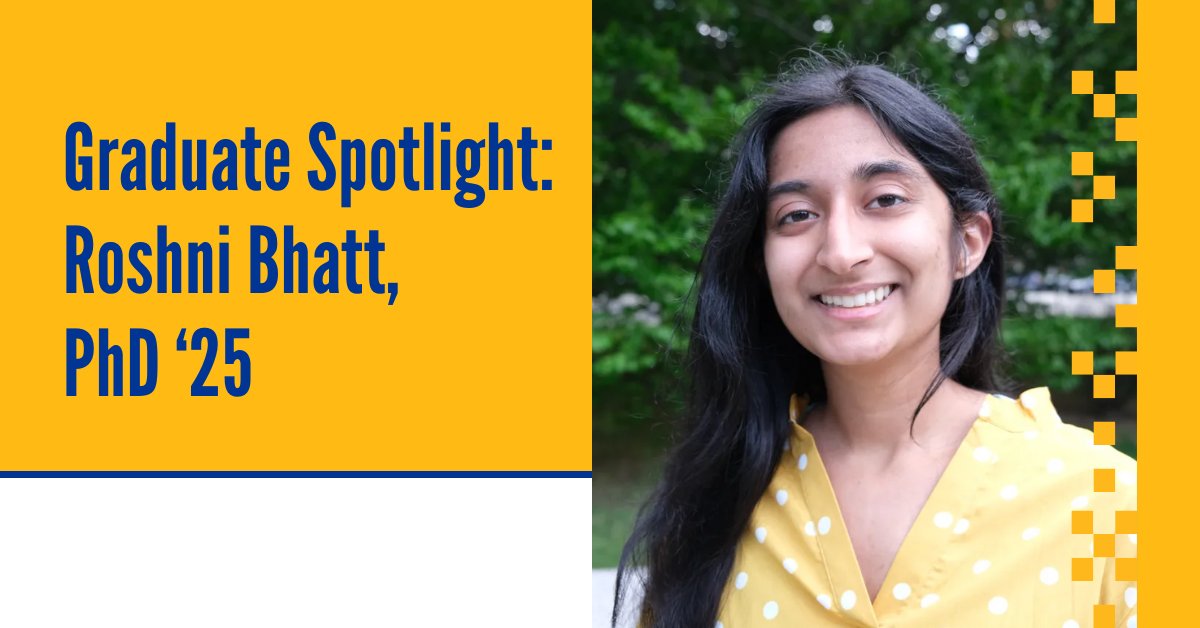Roshni Bhatt first considered a career in science as a high school student with an insatiable curiosity. She asked her chemistry and anatomy teachers questions with undiscovered answers, and her teachers suggested she become a researcher. This inquisitive nature and passion for science has been a guiding star of Bhatt’s academic journey.
She earned her bachelor’s degree in biochemistry and computer science from Case Western University. Bhatt tried her hand at wet lab research as an undergraduate student but enjoyed working at the intersection of biology and computer science more. Wishing to develop these skills, she applied to the Joint Carnegie Mellon-University of Pittsburgh PhD Program in Computational Biology (CPCB).
“What brought me to Pittsburgh was this program was a really good balance of a lot of things, and the students were very welcoming. I didn’t feel intimidated at all when I visited during welcome days,” Bhatt said.
Opportunities for Discovery
Once Bhatt settled into Pittsburgh and CPCB, she found writing, teaching and research opportunities that made her feel at home.
In 2021, she became a science writer for bioZone, a PhD student-produced YouTube biology channel. Since then, Bhatt has created more than 40 videos for bioZone on a variety of topics ranging from the Vagus nerve to blue soup.
“With YouTube science writing, there’s so much freedom to be fun and think about visuals and tone and the way that you’re conveying something to readers to help them understand better,” she said.
Now that Bhatt has a professional video portfolio, she has also begun writing for the prolific YouTube channel SciShow. She has been watching SciShow since she was in high school, so working for them has always been a dream. She previously applied as an undergraduate student but credits the science communication experiences she’s had during her PhD for helping her land the job.
Paying Knowledge Forward
Bhatt has also had the chance to pursue her love for teaching throughout graduate school. She teaches programming courses for the Foundation for Advanced Education in the Sciences (FAES), a nonprofit committed to professional development. Outside of her work with FAES, she mentors undergraduate students who are interested in research.
“When I’m teaching someone, I can see them understand something, and I can see them being proud of themselves in that moment,” Bhatt said. “That’s like an immediate dopamine hit.”
As Bhatt prepares to cross the graduation stage, she is looking forward to combining interests in science communication and research. She aspires to work in a computing or sequencing core at a university, where she can explore a variety of research topics and contribute to multiple projects.
“Getting my PhD has been a goal of mine for so long and being a grad student has been my life for so long, so I’m grateful for the opportunity to figure out what the next big thing is,” she said.
Three questions with the graduate:
What did you enjoy most about being a graduate student in Pittsburgh?
“I like to go to a lot of the events that the museums put on, like cooking classes and craft classes at Phipps and 21 plus nights at the Carnegie Science Center. The city is really good at having a bunch of things going on for specific groups of people.”
What advice do you have for prospective students?
“Don’t be afraid to take advantage of other opportunities that are not research, whether that means doing more teaching or random stuff like science writing for a YouTube channel. If you have other things in your life you want to pursue, it’s worth it to use the University’s resources to do so because that’s what they’re there for.”
What was your favorite class in the CPCB program?
“I liked lab methods because it gave students the space to think about the origins of data and see the whole process of the work that goes into the data. These are things I think we need to be aware of.”


